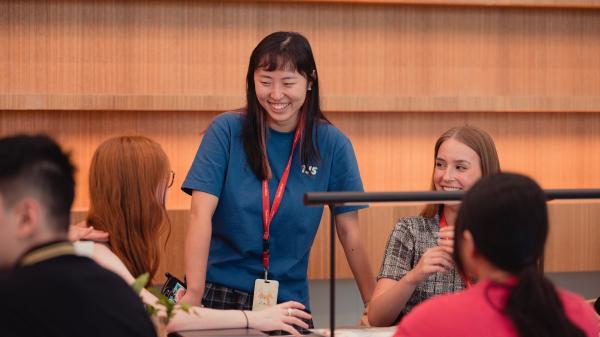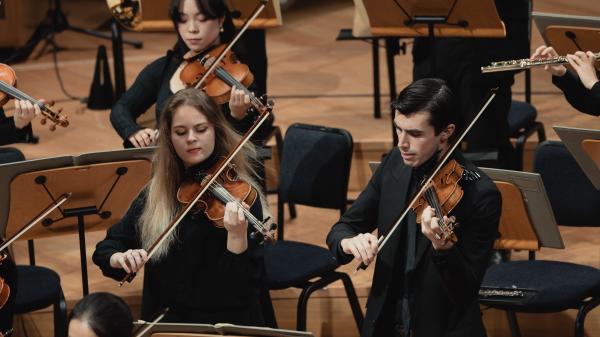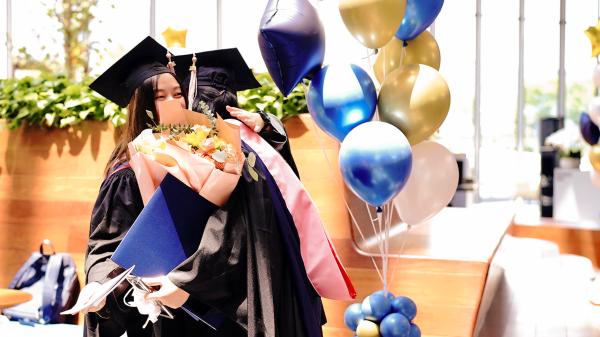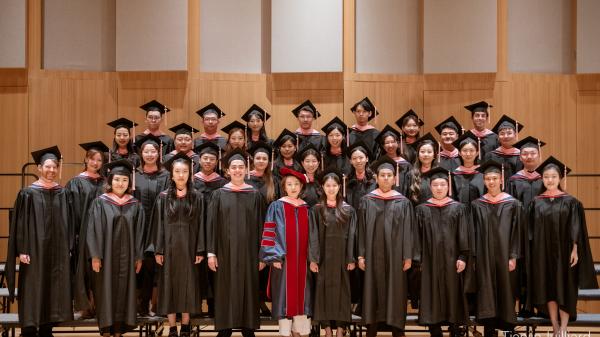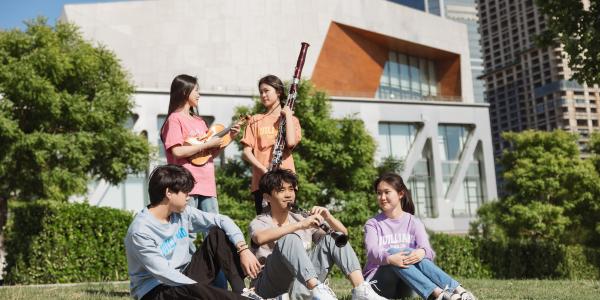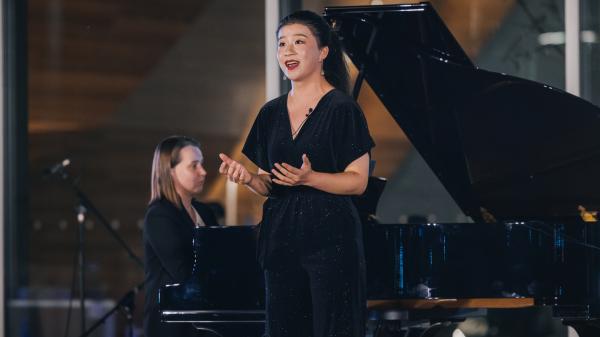Graduate Division Student Body Profile
|
Fall 2020 Degree seeking students |
Full-time Graduate students |
Total Student body |
|
Gender |
||
| Male | 53% |
53% |
| Female | 47% | 47% |
|
Race/Ethnicity |
||
| Nonresident Alien | 89% | 89% |
| Hispanic/Latino | 3% | 3% |
| American Indian or Alaska Native | 0% | 0% |
| Asian | 0% | 0% |
| Black or African American | 0% | 0% |
| Native Hawaiian or other Pacific Islander | 0% | 0% |
| White | 8% | 8% |
| Two or more races | 0% | 0% |
| Race and ethnicity unknown | 0% | 0% |
| Total number of students | 38 | 38 |
Juilliard’s Statement on Academic and Artistic Freedom
The mission of The Juilliard School is to provide the highest caliber of artistic education for gifted musicians, dancers, and actors from around the world, so that they may achieve their fullest potential as artists, leaders, and global citizens.
To this end, The Juilliard School is committed to the general principles of academic and artistic freedom and guarantees Juilliard faculty the broadest possible latitude to perform, create, speak, write, publish, listen, challenge, teach, and learn, in the classroom, on the stage or other performance venues, or elsewhere on campus. This latitude includes expression that others may find unwelcome or offensive. This commitment assures Juilliard faculty the right to teach and students to learn in an environment where excellence in artistic practice and intellectual honesty are realized, in keeping with the school’s mission.
This commitment does not mean that faculty may say or write whatever they wish, wherever they wish. Juilliard may restrict expression that violates the law, that defames others, that constitutes a genuine threat or harassment, that unjustifiably invades privacy or confidentiality interests, or that otherwise results in the creation of a hostile environment. In addition, Juilliard may restrict expression that is incompatible with the functioning of the school and may reasonably regulate the time, place, and manner of expression to ensure that it does not disrupt the ordinary activities of the school.
While Juilliard faculty retain their right to free expression both on and off campus, exercise of this right in light of their association with The Juilliard School comes with considerable responsibility. As scholars and working artists, many of whom are often in the public eye, faculty are expected to acknowledge clearly that their opinions and convictions are personal and not institutional. Faculty are also expected, per Juilliard’s Standards of Ethical Conduct, to refrain from activities that conflict with the best interests of the school and avoid conduct that could compromise the integrity or reputation of the school.
As an international institution, The Juilliard School is committed to understanding and respecting the traditions and laws of various societies; however, the free speech norms of the United States are always the foundation upon which our decisions are made.
Decisions regarding limits to academic and artistic freedom will be made by the Office of the Provost with input from faculty.
The Tianjin Juilliard School in Tianjin will abide by and uphold this Statement on Academic and Artistic Freedom, understanding that we also need to be cognizant of local laws related to our venue, when appropriate.
This policy is subject to periodic institutional review.
Students
At Tianjin Juilliard, you are part of a vibrant international community, where you can discover a new world of musical opportunities and transform your passion into artistry!
Admissions Events
Virtual Campus Tour
At this time, we are pleased to offer virtual interactive tours of Tianjin Juilliard's brand new, state-of-the-art campus! These tours will be led by a member of the admissions team and will provide an overview about our campus, program offerings, application and audition information, and more.
Tours take place entirely online in a webinar format, allowing the tour guide to show photos of the campus while providing a narrative about the school and the facilities. Participants can use the chat function in the webinar to ask questions. Tour capacity is limited to ensure that all tour participants are able to participate and have their questions answered.
Virtual tours of The Tianjin Juilliard School are free of charge and available to prospective applicants (students applying within the next two to three years).
Click here to learn more and register for a virtual campus tour!
In-Person Campus Tour and Open House
The Tianjin Juilliard School has started to offer in-person campus tours and open houses for small groups of prospective Pre-College applicants and their families. Events are led by a member of the Admissions Office who will provide an overview of our campus, program and application information, and more.
Tianjin Juilliard is committed to the health and safety for our entire community. Our visitor policy includes comprehensive steps to ensure that our students, faculty, staff, and those coming to campus are safe. After registering for a tour, you will receive an email that includes our visitor policy, as well as information about what you will need to prepare before your visit. You must read our visitor policy carefully before completing the registration form and coming to campus.
Events of The Tianjin Juilliard School are free of charge, however, participation of campus tour is only available to prospective applicants (students applying within the next 2 years), and the open house is only open to applicants who plan to apply this year.
Click here to learn more and register for an in-person campus tour or open house!
Virtual Information Session
Throughout the fall semester, Tianjin Juilliard Admissions staff will offer webinars providing an overview of Tianjin Juilliard's Pre-College application and audition process. The following topics will be available:
- Account and Application Creation
- Student Life at Tianjin Juilliard
- Pre-Screen Recording and Final Audition Tips
- Conversation with Students
- Conversation with Resident Faculty
Other topics may be added. If there is a particular topic that you would like us to address, please email admissions.pc@tianjinjuilliard.edu.cn
Click here to learn more and register for a virtual information session!
Assessment and Care Team (A.C.T.)
Responsibilities
- Gather information across all departments (performance, academic, and administrative)
- Track “red flags” over time and provide a quick response to high risk concerns
- Detect patterns, trends, and disturbances in individual or group behavior may perform initial threat assessments
- Determine the best mechanisms for support, intervention, warning/notification and response
- Provide resources and coordinate team-member follow-up with the student
- Raise community awareness continually review procedures and communications
Red Flags or Potential Warning Signs
Any behavior that raises concern for a student's well-being, including:
- Academic
- Concerns related to low grades, poor study skills, and other behaviors related to academic performance
- Deterioration in quality of work
- Missing assignments or appointments
- Repeat absences from classes or lessons
- Seeking unusual accommodations
- Acting withdrawn or inappropriate
- Other
- Social/Adjustment:
- Inclusive of social adjustment issues, not fitting in, homesickness, concerns related to diversity, and roommate or community conflicts
- Expressions of concern about a student by peers
- Written statements or verbalization of hopelessness, futility or lack of energy
- Your own sense, however vague, that something is seriously amiss with the student
- Other
- Health:
- Inclusive of behaviors such as observed eating disorder behavior, alcohol/drug, prolonged illness, sustained injury, self-harm or cutting behavior, observed depressive behavior, suicidal ideation/attempt, hospitalization, or other like concerns
- Deterioration in physical appearance or personal hygiene
- Excessive fatigue or sleep difficulties
- Unusual weight gain or loss
- Exaggerated personality traits or behaviors
- Irritability, constant anxiety or tearfulness
- Marked changes in concentration or motivation
- Other
- Personal Concerns:
- Inclusive of things such as financial concerns, family or general home concerns, death or illness in the family, or legal concerns
- Direct statements indicating family problems, personal losses such as death of a family member, or the break-up of a relationship
- Other
Referrals
To make in-person private referrals, please select the individual's name below you wish to speak with and send an inquiry via email.
Shuli Xu, Associate Dean of Student Development
Ken Lam, Director of Orchestral Studies
Irena Klaic, Library Director
Chang Wang, Resident Faculty
Xiangyu Zhou, Resident Faculty
June Zhu, Director of Counseling and Wellness
Chen Chen, Residence Life Manager
Zhishan Li, Student Services Manager
Linlin Guo, Student Development Office Coordinator
Referral Form
The Assessment and Care Team (ACT) Referral Form allows members of the Tianjin Juilliard community to report concerns about the wellbeing of students (see “Referral Type” on the form). If you wish to report an immediate life-threatening emergency, please call 110 first, and then notify Tianjin Juilliard Public Safety Office (022-66336498) at your earliest convenience. Information shared in this form will be viewed first by the Associate Dean of Student Development and shared only with relevant parties tasked with formulating a timely response. Every effort will be made to keep the referrer’s information private, but your name and contact information are crucial in case follow-up by ACT is necessary.
Link: The Assessment and Care Team (ACT) Referral Form
Pre-College Faculty Information
Studio and Classroom Faculty Information for Pre-College
Studio and Classroom Faculty Teaching Schedules
The Pre-College office schedules lesson times and will send teaching schedules to faculty by email.
Change of Major Teacher
- Teacher’s initiative: The teacher must notify the student personally of the intention to discontinue teaching as soon as possible after the May jury examination. Leading up to this announcement, the teacher should give warnings and indications throughout the semester, and the teacher’s concerns should be reflected in the semester grade. Under no circumstances will a teacher be permitted to discontinue a student after June 15 for the following school year.
- Student’s initiative: Changes may be made only between academic years. The students should discuss their desire to change studios with the Pre-College administration before contacting a prospective teacher. If a student approaches a faculty member who is not their current studio teacher about joining their studio, the faculty member must contact the Pre-College administration before making any commitment to the student.
Class Rosters
Pre-College class rosters for each academic year are emailed directly to faculty.
Attendance
The Pre-College allows student absences with proper advance notification.
- Students or parents are responsible for notifying the Pre-College Office, studio teachers, and chamber music coaches of absences by Tuesday before the Saturday absence.
- In the event of a sudden illness or emergency, students or parents are responsible for notifying the Pre-College Office, studio teachers, and chamber music coaches no later than 8:00 am on Saturday.
Students are in jeopardy of failing a course after accruing five or more absences, which includes any combination of absences and late arrivals. Please see the Pre-College Student Handbook for a detailed explanation of Pre-College attendance policies.
Music Juries
Juries (performance examinations) are required in the spring semester every academic year for all students except for graduating (12th grade) students. An average of the grades given by the adjudicating faculty will appear on the student's transcript in addition to a spring semester grade given by the student’s major teacher. Individual jury schedules are announced in May.
Leave of Absence Re-Entry Jury
Students who are granted a Leave of Absence will notify their wish to return by April 1. They are expected to present a re-entry jury in mid-late April, and will only be re-admitted into the Pre-College with a passing composite grade by a faculty jury panel. Students are recommended to continue taking lessons with their major teacher during the entire period of Leave of Absence. Major teachers should also help prepare students for their re-entry jury.
Participation in Entrance Auditions, Juries, and Required Recitals
All studio faculty members are expected to participate in students’ entrance auditions and juries. Auditions will be scheduled between January 15 and April 15 each year; specific dates will be published at least 6 months in advance and will managed by the Admissions Office. Jury dates can be found on each year’s academic calendar. It is the responsibility of faculty members to arrange their own schedules so that their availability for auditions and juries is protected.
Studio teachers are expected to attend their students’ required recitals as a significant component of their instruction and relationship with students.
Classroom Protocol
Any classroom behavior that interferes with the instructor’s ability to teach or distracts from the concentration of other students will not be tolerated. Such behavior may include: eating or drinking; talking to a neighbor in a disruptive manner; using electronic devices for non-academic purposes, including a cell phone; inappropriate language; physical violence of any kind; and arriving late and/or leaving early without permission. If actions detract from the learning of any other person in the class, the offender will be asked to leave class immediately. If the student continues to be disruptive and does not leave the room after being clearly told to do so, the teacher’s report to the Assistant Dean will place the student on disciplinary probation, with the potential of being dismissed from school.
Performance Registration
There are many performance opportunities for Pre-College students. It is the responsibility of the studio faculty to help guide their students to prepare and register for suitable performance opportunities and help maintain a high standard of performance. Each student should perform at least once each semester.
Course Evaluations
The Pre-College Office will be sending course evaluations to all students at the end of each year, giving the students an opportunity to provide feedback about the course and their teachers.
Faculty Software and Applications
Canvas
Canvas is an online learning management systems (LMS) embedded in Juilliard OKTA for faculty to share documents, post announcements and assignments, and keep track of teaching modules. Faculty could also use Canvas to take attendance if needed. Faculty could choose whether or not to use Canvas based on teaching habits and needs. The data in Canvas will be archived when semester ends.
Cadence
Cadence is the Student Information System (SIS) to keep track of student information, academic status, and grades. Faculty should upload student grades to Cadence by the end of each semester after the course ends.
Rooms, Facilities, and Piano Usage for Pre-College
Use of Studios and Rooms
Room assignments for lessons and classes are handled through the Pre-College Office. Please contact us directly if you have any special requests.
Faculty can access their assigned teaching studios/classrooms by swiping their ID card at the door. Access is granted by the Pre-College Office through Asimut, the room-booking system. For special room booking requests, such as large rehearsal halls, please contact the Pre-College Office for assistance.
Tianjin Juilliard spaces are to be used only by members of the Tianjin Juilliard community and for Tianjin Juilliard-related purposes. Note that Tianjin Juilliard faculty are not allowed to teach private students on the Tianjin Juilliard premises.
Faculty Lounge
The lounge outside of the Pre-College Office area on the second floor of Building C is for faculty. There is also a pantry with a coffee machine, refrigerator, and microwave.
Photocopying
Faculty are welcome to use the copy machine for school-related materials located throughout the school, and in the Library on the 4th floor during school hours. The copy machines can accommodate copying large scores and can forward scanned documents via email.
The copyright law of the United States (Title 17, United States Code) governs the making of photocopies of other reproductions of copyrighted materials.
The School’s equipment may not be used for unauthorized photocopying. For more information, please see The School's Copyright and Fair Use Policy.
Piano and Harpsichord Moving and Maintenance
- All piano moving requests should be sent to the Tianjin Juilliard School head piano technician as well as to the Pre-College Office.
- Piano moving within a classroom or studio is not permitted.
- Moving concert grands from room to room or to an external location requires professional piano movers.
- To report piano damage or request piano maintenance, please email pianomaintenance@tianjinjuilliard.edu.cn.
Staff Pianists
All TJS staff pianists are hired through a formal audition and interview process. The staff pianists are managed by TJS Staff Pianist Coordinator, Allie Su (allie.su@tianjinjuilliard.edu.cn). For any collaborative piano needs, please direct your questions to Allie Su who manages repertoire assignments and schedules.
Tuning
A=441 is the tuning standard for pianos at Tianjin Juilliard.
Standards and Regulations for Pre-College
Grading System
Students receive grades each semester for all of their classes. The grades will become part of the student’s permanent record. Grades are recorded as follows:
Letter Grades
| A+ | |
| A | |
| A- | |
| B+ | |
| B | A grade of B in major lessons or juries warrants performance warning |
| B- | A grade of B- or lower in major lessons or juries warrants performance probation |
| C+ | |
| C | |
| C- | |
| D | A grade of D or lower in any academic subject warrants academic warning |
| F | A grade of F in any academic subject warrants academic probation |
Non-letter Grades
| I | Incomplete |
| IA | Insufficient Attendance |
| P | Pass |
| W | Withdrawn |
Satisfactory Progress
Students are expected to apply themselves seriously to their studies and to conduct themselves in a manner consistent with the standards of The Tianjin Juilliard School.
In order to maintain satisfactory progress, students must:
- Receive a B+ or above in their major area of study and on their jury
- Receive a C- or above in any other subjects
Grade Appeal
Students may contest a grade by writing to the Pre-College Assistant Dean after which they may be directed to consult with the faculty member to understand better the computation of the grade. Further appeal will be guided by the Assistant Dean.
Mid-Semester Reports
The purpose of the mid-semester report is to help the PC Administration become aware of any academic or behavioral issues when the semester is in progress and to gain insight on general student progress. A survey is sent out to all PC faculty in the middle of each semester. Faculty should provide clear and timely feedback. Should any issues require immediate attention, the PC Office will schedule a meeting with both the student and the parent to discuss the issues. The mid-semester meetings serve as a warning and a reminder, and no academic or probation status changes will be issued during the semester.
Graduating students
All graduating students are eligible to receive a Certificate of Graduation from the Pre-College Division provided they fulfill the following requirements:
- Successful completion of all required course work
- Satisfactory performance of a solo recital during their 12th grade year
- Recommendation by the faculty
Graduating students who do not fulfill these requirements will receive a Certificate of Attendance.
Pre-College Commencement is usually held on the last day of the academic year.
Academic Standing
Students begin their studies at Tianjin Juilliard in good standing and are expected to maintain that status throughout their programs of study at the School. Should a student’s progress fall below departmental standards with respect to any aspect of the qualitative and quantitative review, the student will receive written notification of a change in enrollment status (warning or probation) as described below. Copies of such notifications are routinely shared with the major teacher.
Standard Categories of Disciplinary Action
Warning/Probation
If a student receives a grade lower than the required minimum, they may receive a letter of warning. Such a letter is normally issued at the close of the semester but may be issued at any time during the academic year. A warning indicates a severe lapse in performance nearly warranting probationary status.
A student may be placed on probation at any time for significant problems in meeting the artistic, technical, and/or professional requirements of their major field of study, including an unprofessional attitude toward class attendance or for a serious breach of ethical conduct.
Academic Warning and Probation
Students will be placed on academic warning if they receive a grade of D in any class other than their lesson or jury. Failure to correct the grade(s) the following semester will result in academic probation. A grade of F immediately places a student on academic probation. Failure to correct the grade(s) after one probationary semester may result in dismissal from the School.
Performance Warning and Probation
Students will be placed on performance warning if they receive a grade of B in their major or on their jury. If they receive a B- or lower, students will be placed on performance probation. If a probationary grade is given in the fall semester, failure to improve the grade to a minimum of a B in the spring semester or as a jury grade may result in dismissal.
If a probationary grade is given either in the spring semester or on the student’s jury at the end of the academic year, an additional jury will be assigned to the student at the end of the following fall semester. Failure to obtain a minimum of a B either as a semester grade or on the additional jury may result in mid-year dismissal.
Graduating students (grade 12) who are on performance probation may be restricted from Pre-College events, such as master classes and competitions. Non-graduating students on performance probation may also be restricted from giving a solo recital.
Dismissal
Students who do not meet The Tianjin Juilliard School’s standards may, at the School’s discretion, be subject to dismissal. A student may be asked to withdraw at any time if their attitude or conduct conflicts with the standards of the School, or if, by remaining enrolled, they endanger their own health or the health of others. Acts of cheating and vandalism are dismissible offenses.
Students who are dismissed are notified in a personal conference with the Associate Dean and Assistant Dean, and by written notification.
Standards of Academic Integrity
Academic misconduct and dishonesty undermine the integrity of teaching and learning in the Pre-College community. Such cases are taken seriously and will be resolved in a fair and consistent manner.
Definitions of Academic Misconduct and Dishonesty
Academic misconduct and dishonesty encompass all classroom, studio, and performance work and includes but is not limited to: plagiarism, unauthorized use of materials or resources (“cheating”), prohibited collaboration or consultation, use of fabricated or falsified information, interference with or sabotage of academic activity, unauthorized taking or receipt of materials or resources to gain an academic advantage, unauthorized recordings, bribery, submission of paper or academic work purchased or obtained from an outside source, and conspiracy to commit academic dishonesty.
Working with Minors Policy
Purpose and Scope
The Tianjin Juilliard School strives to maintain a safe and secure environment for minors participating in Tianjin Juilliard programs and activities.
The Tianjin Juilliard School’s Working with Minors Policy (this “Policy”) applies to all programs and activities operating under the authority and direction of the School and taking place: (i) on the Tianjin Juilliard or Tianjin Conservatory of Music campuses or (ii) off-campus. This Policy establishes guidelines for Authorized Adults (as defined below) who may work or interact with individuals under the age of 18 in a covered program or activity.
Definitions
"Minor" for purposes of this Policy means any person under the age of 18 who is participating in a Tianjin Juilliard School program or activity, excluding (i) on-campus guests or attendees at a public performance; and (ii) prospective students touring or visiting the School.
“Authorized Adults” for purposes of this Policy means all individuals, ages 18 and over, paid or unpaid, who instruct, supervise, chaperone or otherwise oversee Minors in connection with Tianjin Juilliard School programs or activities. This includes, but is not limited to, faculty, staff, students, parents, volunteers, interns, apprentices, independent contractors, consultants, alumni, guest artists or other personnel who will participate in any way in a Tianjin Juilliard School program or activity that includes Minors.
Guidelines for Programs Involving Minors
All Tianjin Juilliard School programs and activities must comply with the following conditions:
Program Registration
All activities in which Minors will participate, other than programs of the Pre-College, whether on or off campus, must be registered with the Office of Human Resources not less than 90 days prior to the commencement of the program. T he registration can be collected from the Office of Human Resources and must include:
- A description of the program, including age and number of participants and whether they will be housed in the Residence Hall.
- A list of all Authorized Adults participating in the program.
- A procedure for notification of participants’ parents or legal guardians in the event of an emergency, including contact information.
- A Medical Emergency Plan, including authorization to obtain emergency medical treatment in the event parents or legal guardians are not available, and disclosure of any allergies or medical conditions that might impact participation in the program.
Training
All Authorized Adults must receive appropriate training in (i) maintaining professional boundaries when working with Minors; (ii) protecting Minors from any form of abusive treatment; and (iii) reporting, under School policy, incidents or suspicions of improper conduct.
Criminal Background Check
Prior to being hired as an Authorized Adult, an applicant must undergo a criminal background check to the extent permitted by law. All background checks must be performed and approved by Human Resources. Criminal background checks may be conducted periodically thereafter if circumstances warrant. Authorized Adults are also required to notify the program director and the Office of Human Resources immediately in the event of an arrest or the conviction of any crime.
Supervision
All programs must establish an adequate plan for supervision. The plan must specify the person having responsibility over all Authorized Adults. Supervision plans must incorporate the following guidelines:
- To the extent practicable, Minors participating in Tianjin Juilliard sponsored programs or activities (other than Minors enrolled in Pre-College programs), whether on or off campus, should not be left unattended. Minors under the age of eleven (11) should be supervised at all times by an Authorized Adult or by their parents or legal guardians.
- When off campus, the minimum ratio for supervision of Minors is at least one Authorized Adult for every twelve (12) Minors.
- Authorized Adults must inform the program director and/or sponsoring department if using an area other than the one specifically designated for the program or activity.
- Although 1:1 interaction is a valuable component of certain areas of instruction at The Tianjin Juilliard School, Authorized Adults should minimize the amount of 1:1 time spent with Minors outside of lessons and adhere whenever possible to the “rule of three,” requiring at least two Authorized Adults or two Minors in a group at all times. Exceptions to this guideline are health care providers, tutors expressly authorized by the program director to provide private instruction or other individuals authorized by the School to provide counseling, advice, private help or assistance.
- Private instruction should be conducted whenever possible in a room or other space that is open or that provides for visibility, e.g. the door to the room has a window. Doors must remain unlocked at all times.
- All instruction must take place on campus or on an approved digital platform, such as Teams or Zoom.
- Human touch is a necessary component of many elements of instruction at The Tianjin Juilliard School. If a Minor appears uncomfortable with any form of physical contact, the Authorized Adult should immediately cease the contact and report the incident to the program director as soon as possible. Advice on using touch in instruction is available from the Associate Dean of Pre-College and Educational Development or Assistant Dean of Pre-College. Additional information on using touch in instruction can be found in Appendix A to this Policy.
- The privacy of Minors must be respected at all times. In situations such as changing clothes, showering or using the restroom, Authorized Adults must not intrude except where health and safety reasons require such intrusion.
- Proper clothing appropriate to the given activity must be worn by Authorized Adults and Minors at all times.
- Whenever possible, minors should be restricted from areas of the facilities where potential safety hazards may exist. Examples include, but are not limited to, mechanical rooms, workshops, construction zones, food preparation areas, or any areas containing power tools or machinery with exposed moving parts.
Prohibited Conduct
The following practices and behaviors are strictly prohibited under this Policy. This list is not meant to be exhaustive:
- Communicating electronically with Minors, except through Tianjin Juilliard’s email system, or when absolutely necessary and related to a particular program or activity in which the Minor is participating. Sending sexually explicit photos or messages and “sexting” is strictly prohibited as is any form of communication through social media. This includes without limitation, the use of WeChat, Facebook, Instagram, or other social media platforms.
- Engaging in the use of, or providing Minors with, alcohol, drugs or other illegal substances, or being under the influence of alcohol, drugs or other illegal substances, during Minor programs or activities. This prohibition includes allowing those substances to be used by a Minor in the Authorized Adult’s presence.
- Disciplining Minors in any manner involving isolation, humiliation or corporal punishment. Any form of discipline must be constructive and appropriate, given the age of the Minor and the circumstances of the situation.
- Engaging in abusive conduct of any kind, either verbal or physical, toward or in the presence of Minors. Bullying (including cyberbullying), hazing and initiations are strictly forbidden.
- Picking up or dropping off Minors at the Minors’ homes, except if specifically authorized in writing by the Minors’ parents or legal guardians and the program director.
- Giving gifts of any kind to Minors.
- Engaging in sexual activity or other inappropriate deliberate physical contact or horseplay with, or in the presence of Minors.
- Making sexual materials or pornography in any form available to Minors or assisting them in any way in gaining access to such materials.
- Making inappropriate or risqué comments to or in the presence of Minors.
- Releasing a Minor’s personal contact information to third parties without the written consent of the Minor’s parent or legal guardian. Even with parental consent, a Minor’s personal contact information, including a Tianjin Juilliard School email address, may only be released in connection with a Tianjin Juilliard School sponsored program or activity in which the Minor is participating.
- Photographing or making videos of Minors for other than program-related purposes. For program-related purposes, photos or videos may be taken only after the Minor’s parent or guardian has signed an appropriate waiver obtained from the program director. Use of any device capable of recording or transferring visual images is forbidden in showers, restrooms, locker rooms, dressing rooms or other areas where privacy is expected.
- Retaliating against anyone who, in good faith, raises a suspicion or allegation of inappropriate conduct toward a Minor.
- Other than immediate family members, Minors participating in Tianjin Juilliard School sponsored programs or activities may not have visitors on-campus, except with the permission of the program director. All visitors must agree to abide by school policies and procedures. Policy violations will result in the suspension or revocation of visiting privileges.
Reporting Harm to Minors
Any Authorized Adult who has a reasonable suspicion that a Minor who is participating in a Tianjin Juilliard School program or activity, has been physically or sexually abused; physically or emotionally neglected; exposed to any form of violence or threat of violence; or exposed to any form of sexual exploitation, must immediately report his or her concerns to the Associate Dean for Pre-College and Educational Development or the Director of Human Resources, who will determine appropriate next steps. Any uncertainty about whether a report is required should always be resolved in favor of making a good faith report. A list of common indicators of child abuse or maltreatment can be found in
Appendix B to this Policy.
Appendix A: Advice on Using Touch in Instruction
Human touch is an essential component of instruction in music. For example, to illustrate a point about breath control, a woodwind professor may press on a student’s diaphragm. It is understood and expected that major studio teachers at Tianjin Juilliard use touch in order to guide their students toward greater artistry.
The traditions of touch in a given art form may be less familiar to inexperienced students. Instructors in these programs should remain mindful of Minor students’ needs and expectations.
Some basic guidelines can help reduce the possibility of misunderstanding or discomfort:
- Touch should always be restricted only to what is necessary and appropriate for the instructional point.
- Explain at the beginning of instruction why, when and how you might touch a student. Parents may also find the information useful.
- Before using touch, give a verbal cue about the touch and its purpose: “Let me adjust your wrist so your hand stays more horizontal.”
- Touching should never take place on any part of the body that would be normally covered by a bathing suit. It is never appropriate to touch someone on sensitive areas, such as a student’s chest, pelvis, buttocks or upper thigh.
- Consider alternatives to touch, such as demonstration or verbal description. A description might explain the position or movement of the body part under consideration and of adjacent parts.
- If a student seems uncomfortable or expresses any concerns about touch, acknowledge the matter. Immediately cease the contact and report the situation to the program director as soon as possible.
- Consider that people experience touch in different ways depending on factors such as cultural background, age, gender and personal experience.
Appendix B: Signs of Child Abuse or Maltreatment
The list that follows contains some common indicators of child abuse or maltreatment. This list is not all-inclusive, and some abused or maltreated children may not show any of these symptoms.
Indicators of physical abuse can include:
- Injuries to the eyes or both sides of the head or body (accidental injuries typically only affect one side of the body);
- Frequently appearing injuries such as bruises, cuts and/or burns, especially if the child is unable to provide an adequate explanation of the cause. These may appear in distinctive patterns such as grab marks, human bite marks, cigarette burns or impressions of other instruments;
- Destructive, aggressive or disruptive behavior;
- Fear of going home or fear of parent(s).
Indicators of sexual abuse can include:
- Symptoms of sexually transmitted diseases;
- Injury to genital area;
- Difficulty and/or pain when sitting or walking;
- Sexually suggestive, inappropriate or promiscuous behavior or verbalization;
- Expressing age-inappropriate knowledge of sexual relations; and
- Sexual victimization of other children.
Indicators of maltreatment can include:
- Obvious malnourishment, listlessness or fatigue;
- Stealing or begging for food;
- Lack of personal care – poor personal hygiene, torn and/or dirty clothes;
- Untreated need for glasses, dental care or other medical attention;
- Frequent absence from or tardiness to school;
- Child inappropriately left unattended or without supervision.
Rules of Conduct and School Policies
Working with Minors
Purpose and Scope
The Tianjin Juilliard School strives to maintain a safe and secure environment for minors participating in Tianjin Juilliard programs and activities.
The Tianjin Juilliard School’s Working with Minors Policy (this “Policy”) applies to all programs and activities operating under the authority and direction of the School and taking place: (i) on the Tianjin Juilliard or Tianjin Conservatory of Music campuses or (ii) off-campus. This Policy establishes guidelines for Authorized Adults (as defined below) who may work or interact with individuals under the age of 18 in a covered program or activity.
Definitions
"Minor" for purposes of this Policy means any person under the age of 18 who is participating in a Tianjin Juilliard School program or activity, excluding (i) on-campus guests or attendees at a public performance; and (ii) prospective students touring or visiting the School.
“Authorized Adults” for purposes of this Policy means all individuals, ages 18 and over, paid or unpaid, who instruct, supervise, chaperone or otherwise oversee Minors in connection with Tianjin Juilliard School programs or activities. This includes, but is not limited to, faculty, staff, students, parents, volunteers, interns, apprentices, independent contractors, consultants, alumni, guest artists or other personnel who will participate in any way in a Tianjin Juilliard School program or activity that includes Minors.
Guidelines for Programs Involving Minors
All Tianjin Juilliard School programs and activities must comply with the following conditions:
Program Registration
All activities in which Minors will participate, other than programs of the Pre-College, whether on or off campus, must be registered with the Office of Human Resources not less than 90 days prior to the commencement of the program. The registration can be collected from the Office of Human Resources and must include:
- A description of the program, including age and number of participants and whether they will be housed in the Residence Hall.
- A list of all Authorized Adults participating in the program.
- A procedure for notification of participants’ parents or legal guardians in the event of an emergency, including contact information.
- A Medical Emergency Plan, including authorization to obtain emergency medical treatment in the event parents or legal guardians are not available, and disclosure of any allergies or medical conditions that might impact participation in the program.
Training
All Authorized Adults must receive appropriate training in (i) maintaining professional boundaries when working with Minors; (ii) protecting Minors from any form of abusive treatment; and (iii) reporting, under School policy, incidents or suspicions of improper conduct.
Criminal Background Check
Prior to being hired as an Authorized Adult, an applicant must undergo a criminal background check to the extent permitted by law. All background checks must be performed and approved by Human Resources. Criminal background checks may be conducted periodically thereafter if circumstances warrant. Authorized Adults are also required to notify the program director and the Office of Human Resources immediately in the event of an arrest or the conviction of any crime.
Supervision
All programs must establish an adequate plan for supervision. The plan must specify the person having responsibility over all Authorized Adults. Supervision plans must incorporate the following guidelines:
- To the extent practicable, Minors participating in Tianjin Juilliard sponsored programs or activities (other than Minors enrolled in Pre-College programs), whether on or off campus, should not be left unattended. Minors under the age of eleven (11) should be supervised at all times by an Authorized Adult or by their parents or legal guardians.
- When off campus, the minimum ratio for supervision of Minors is at least one Authorized Adult for every twelve (12) Minors.
- Authorized Adults must inform the program director and/or sponsoring department if using an area other than the one specifically designated for the program or activity.
- Although 1:1 interaction is a valuable component of certain areas of instruction at The Tianjin Juilliard School, Authorized Adults should minimize the amount of 1:1 time spent with Minors outside of lessons and adhere whenever possible to the “rule of three,” requiring at least two Authorized Adults or two Minors in a group at all times. Exceptions to this guideline are health care providers, tutors expressly authorized by the program director to provide private instruction or other individuals authorized by the School to provide counseling, advice, private help or assistance.
- Private instruction should be conducted whenever possible in a room or other space that is open or that provides for visibility, e.g. the door to the room has a window. Doors must remain unlocked at all times.
- All instruction must take place on campus or on an approved digital platform, such as Teams or Zoom.
- Human touch is a necessary component of many elements of instruction at The Tianjin Juilliard School. If a Minor appears uncomfortable with any form of physical contact, the Authorized Adult should immediately cease the contact and report the incident to the program director as soon as possible. Advice on using touch in instruction is available from the Associate Dean of Pre-College and Educational Development or Assistant Dean of Pre-College. Additional information on using touch in instruction can be found in Appendix A to this Policy.
- The privacy of Minors must be respected at all times. In situations such as changing clothes, showering or using the restroom, Authorized Adults must not intrude except where health and safety reasons require such intrusion.
- Proper clothing appropriate to the given activity must be worn by Authorized Adults and Minors at all times.
- Whenever possible, minors should be restricted from areas of the facilities where potential safety hazards may exist. Examples include, but are not limited to, mechanical rooms, workshops, construction zones, food preparation areas, or any areas containing power tools or machinery with exposed moving parts.
Prohibited Conduct
The following practices and behaviors are strictly prohibited under this Policy. This list is not meant to be exhaustive:
- Communicating electronically with Minors, except through Tianjin Juilliard’s email system, or when absolutely necessary and related to a particular program or activity in which the Minor is participating. Sending sexually explicit photos or messages and “sexting” is strictly prohibited as is any form of communication through social media. This includes without limitation, the use of WeChat, Facebook, Instagram, or other social media platforms.
- Engaging in the use of, or providing Minors with, alcohol, drugs or other illegal substances, or being under the influence of alcohol, drugs or other illegal substances, during Minor programs or activities. This prohibition includes allowing those substances to be used by a Minor in the Authorized Adult’s presence.
- Disciplining Minors in any manner involving isolation, humiliation or corporal punishment. Any form of discipline must be constructive and appropriate, given the age of the Minor and the circumstances of the situation.
- Engaging in abusive conduct of any kind, either verbal or physical, toward or in the presence of Minors. Bullying (including cyberbullying), hazing and initiations are strictly forbidden.
- Picking up or dropping off Minors at the Minors’ homes, except if specifically authorized in writing by the Minors’ parents or legal guardians and the program director.
- Giving gifts of any kind to Minors.
- Engaging in sexual activity or other inappropriate deliberate physical contact or horseplay with, or in the presence of Minors.
- Making sexual materials or pornography in any form available to Minors or assisting them in any way in gaining access to such materials.
- Making inappropriate or risqué comments to or in the presence of Minors.
- Releasing a Minor’s personal contact information to third parties without the written consent of the Minor’s parent or legal guardian. Even with parental consent, a Minor’s personal contact information, including a Tianjin Juilliard School email address, may only be released in connection with a Tianjin Juilliard School sponsored program or activity in which the Minor is participating.
- Photographing or making videos of Minors for other than program-related purposes. For program-related purposes, photos or videos may be taken only after the Minor’s parent or guardian has signed an appropriate waiver obtained from the program director. Use of any device capable of recording or transferring visual images is forbidden in showers, restrooms, locker rooms, dressing rooms or other areas where privacy is expected.
- Retaliating against anyone who, in good faith, raises a suspicion or allegation of inappropriate conduct toward a Minor.
- Other than immediate family members, Minors participating in Tianjin Juilliard School sponsored programs or activities may not have visitors on-campus, except with the permission of the program director. All visitors must agree to abide by school policies and procedures. Policy violations will result in the suspension or revocation of visiting privileges.
Reporting Harm to Minors
Any Authorized Adult who has a reasonable suspicion that a Minor who is participating in a Tianjin Juilliard School program or activity, has been physically or sexually abused; physically or emotionally neglected; exposed to any form of violence or threat of violence; or exposed to any form of sexual exploitation, must immediately report his or her concerns to the Associate Dean for Pre-College and Educational Development or the Director of Human Resources, who will determine appropriate next steps. Any uncertainty about whether a report is required should always be resolved in favor of making a good faith report. A list of common indicators of child abuse or maltreatment can be found in
Appendix B to this Policy.
Appendix A: Advice on Using Touch in Instruction
Human touch is an essential component of instruction in music. For example, to illustrate a point about breath control, a woodwind professor may press on a student’s diaphragm. It is understood and expected that major studio teachers at Tianjin Juilliard use touch in order to guide their students toward greater artistry.
The traditions of touch in a given art form may be less familiar to inexperienced students. Instructors in these programs should remain mindful of Minor students’ needs and expectations.
Some basic guidelines can help reduce the possibility of misunderstanding or discomfort:
- Touch should always be restricted only to what is necessary and appropriate for the instructional point.
- Explain at the beginning of instruction why, when and how you might touch a student. Parents may also find the information useful.
- Before using touch, give a verbal cue about the touch and its purpose: “Let me adjust your wrist so your hand stays more horizontal.”
- Touching should never take place on any part of the body that would be normally covered by a bathing suit. It is never appropriate to touch someone on sensitive areas, such as a student’s chest, pelvis, buttocks or upper thigh.
- Consider alternatives to touch, such as demonstration or verbal description. A description might explain the position or movement of the body part under consideration and of adjacent parts.
- If a student seems uncomfortable or expresses any concerns about touch, acknowledge the matter. Immediately cease the contact and report the situation to the program director as soon as possible.
- Consider that people experience touch in different ways depending on factors such as cultural background, age, gender and personal experience.
Appendix B: Signs of Child Abuse or Maltreatment
The list that follows contains some common indicators of child abuse or maltreatment. This list is not all-inclusive, and some abused or maltreated children may not show any of these symptoms.
Indicators of physical abuse can include:
- Injuries to the eyes or both sides of the head or body (accidental injuries typically only affect one side of the body);
- Frequently appearing injuries such as bruises, cuts and/or burns, especially if the child is unable to provide an adequate explanation of the cause. These may appear in distinctive patterns such as grab marks, human bite marks, cigarette burns or impressions of other instruments;
- Destructive, aggressive or disruptive behavior;
- Passive, withdrawn or emotionless behavior; and
- Fear of going home or fear of parent(s).
Indicators of sexual abuse can include:
- Symptoms of sexually transmitted diseases;
- Injury to genital area;
- Difficulty and/or pain when sitting or walking;
- Sexually suggestive, inappropriate or promiscuous behavior or verbalization;
- Expressing age-inappropriate knowledge of sexual relations; and
- Sexual victimization of other children.
Indicators of maltreatment can include:
- Obvious malnourishment, listlessness or fatigue;
- Stealing or begging for food;
- Lack of personal care – poor personal hygiene, torn and/or dirty clothes;
- Untreated need for glasses, dental care or other medical attention;
- Frequent absence from or tardiness to school;
- Child inappropriately left unattended or without supervision.




